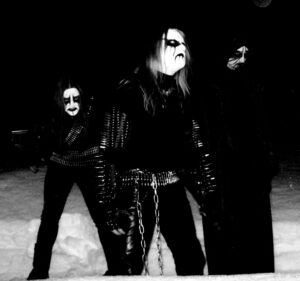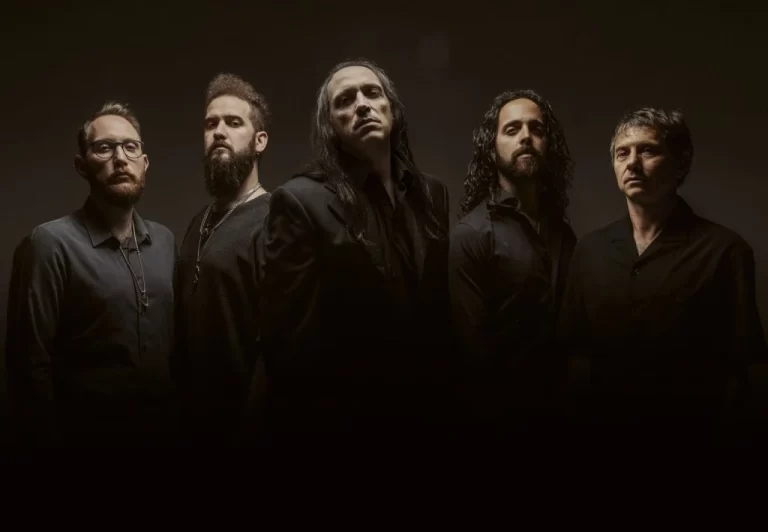
As a music fan do you consider yourself to be open minded or guided by certain principles? Do you regard certain aspects of music as acceptable and other areas taboo? Is there a difference between preaching freedom and enacting it and how can we, as listeners, tell the difference? Werwolf of Satanic Warmaster represents a chilling case in point. Condemned by critics as being a Nazi, there is little reference either specifically, or implicitly within analogy, in his lyrics to suggest that Werwolf promulgates national socialist values and yet a combination of close-to-the-bone song titles (‘gas chamber’ proving to be a particular sticking point) and flirtation with extremist imagery has led to the distancing of not only fans, but musicians within the black metal scene from Satanic Warmaster, a situation which culminated in the removal of the band from the Hellfest bill amidst a storm of protest and criticism.
Worryingly, the bulk of the critics arrayed against Werwolf seem entirely unfamiliar with his work. Like the critics who picketed Marilyn Manson shows in the wake of Columbine, knowledge and belief seem to have been conflated so that one person’s misrepresentation of Satanic Warmaster’s music has now become seen as fact by the baying masses. Analysis and understanding, as any student of politics, history or literature will tell you, however, is impossible if you don’t familiarise yourself with the source material. It is easy, for example to be a Satanist simply by saying that it is so. It is hard, however, to actually follow Satanic principles without a knowledge of what they are and even harder to criticise the Bible without having read it. Moreover there seems to have developed, specifically within the Western sphere, an allergy to analysing and understanding what we ‘know’ to be evil. Condemning racism, sexism, Nazism is easy because they fall into the category of ideologies that are inherently wrong, but without the vital understanding of these ideologies how can anyone say that it is so? As a politics student one of my tasks was to read and analyse ‘Mein Kampf’ (Hitler’s massive tome written before his rise to power) a task which proved fascinating and provided a backbone to the criticism I would later make of Nazi ideology. However, in trying to actually find the book I recall receiving a letter from one teacher of history saying that if they had possessed the book they would have burned it apparently unaware that burning the books of those who hold values other than your own is an inherently extremist action. Yet it seems that people are afraid to confront what they know, or believe they know, to be wrong, lest some aspect of it should appeal to them despite the fact that it is understanding that has paved the way for modern civilisation and understanding that brings the most successful criticism.
To truly defeat something that you believe to be wrong or unacceptable, then, you have to understand it. Simply telling a group of people that something is wrong is a quick way to sow the seeds of discontent from which extremism is so often born, because without understanding how can we be expected to move beyond the most basic knee-jerk reactions that typify a weak and terrified society. It is exactly this reactionary behaviour that we have witnessed recently with Satanic Warmaster’s removal from the bill at Hellfest – an unfounded move that has, ironically, raised the band’s profile far higher than simply allowing them to play their slot.
You may not like Satanic Warmaster. You may hate their music, their image or their ideology. Yet without understanding there is no foundation for boycotting shows, removing the band from a bill or questioning Werwolf’s ethical position. Here we are proud to present an interview in which we have provided a platform for Werwolf to express himself as he sees fit. If, at the end, you disagree with what he has to say then you will do so from a position of knowledge and understanding and be the stronger for being so. We have not asked Werwolf for an explicit restating of his political position – you can read his words and judge for yourself – but we have, I believe, allowed one of the few artists brave enough to state his opinion openly and honestly, a chance to clarify his beliefs and philosophy without turning the interview into a narrow-minded interrogation while a second section (for those who choose to read it) offers up information on the recording of the quite excellent ‘Nachzehrer’ album in a more traditional music magazine interview format. To quote Francis Bacon “knowledge is power” and in this instance a greater knowledge of Satanic Warmaster will offer up a greater power to both critics and supporters of the band. Read on and see…
- Formation and ideology
When you formed Satanic Warmaster did you already have a fully-fledged ideology or has that developed in tandem with the music that you create?
-When I first envisioned Satanic Warmaster, I was 19 years old, and a lot was yet to be experienced and learned. It was still clear that I wanted to portray my music the way I wanted to live my life, free from moral/social conformity, guided by primal instincts and seeking a path and a throne of my own.
How do you reconcile the fact that you have gone on record as a committed Satanist and yet espoused the notion that Black metal is profoundly nihilist in outlook – surely the two are incompatible?
Black Metal is a reflection of a Satanist, a crude sword crafted from his philosophy that will and must shatter all illusions and values that try to hold you back. To create a world of your own you always need a force to destroy the old.
Would you agree that morality as such has no place in music?
-In music, as in art in general, morality does not exist.
The demands placed upon music to exist within the norms and mores of society is arguably a result of its commercialisation – do you feel that artists are responsible to the public or should they be free to promulgate, practice and disseminate their belief systems as they would be able to do in any other art form?
-True art never should bow down to the pressure of the human morality. Naturally when money and so called “freedom” come into the picture, things change and many of those who would not necessarily portray their art in a “nice” manner can only find solution in compromise, instead of forcing themselves through the barriers onto higher ground.
It is, perhaps, interesting to note that radical Christianity, imperialism (particularly in the post 9/11 world) war and bigotry can be (and have been) expressed within music with little or no interference because they conform to more readily acceptable Western ideals – the dual standard must surely be galling?
-Of course things that have been marketed as “morally just” even though they might not be far from the holocaust and other historical persecutions can be preached without any problems. The same double standard stands for many other things, like the freedom in Europe for Left wing rioting/terrorism in many cities, which in many cases is even advocated by media etc. because of them “being on a good cause”.
The lyrics, certainly for the current album, hark back to the most primitive paganism and folk lore – what sources do you use for inspiration?
-I wouldn’t say “paganism”, but rather I for example envisioned the true (and at the same time frightening yet appealing) result of total anarchy in “Warmaster Returns”, which leads to the return of tribalism, which is gladly lightyears from what some people have envisioned concerning humanity becoming one big happy family. In general in my lyrics I reflect the dark side of the European soul, usually with themes from the most gruesome tales of our dark past.
What do you think about the notion that Black metal is separated from other music genres less by its extremism than by its lyrical and musical honesty?
-I would like to say that there is a separation between Black Metal and other styles of music (from my own perspective at least), but because of what I’ve seen and experienced, I really cannot say that Black Metal in general is any different from other kinds of music.
If I were to ask you categorically whether you were a Nazi (which feels, frankly, redundant) do you feel that you would be able to give any answer that would be considered satisfactory by those who have already condemned you?
No, I wouldn’t.
As Satanism is what could be termed a ‘selfish’ standpoint (insofar as it concerns the furthering of the self as opposed to the furthering of a state body) does it strike you as incongruous that it is so often linked to an authoritarian dogma that demands the sacrifice of the self to a greater power and discipline?
-Satanism from an individual point of view is power, struggle for your own elbow room, arrogance, dignity and acknowledgement of higher forces/values than ourselves. Things like this can be applied to a tribal/national scale just as well, and there is nothing wrong with that. We have to sacrifice ourselves just the same on our own altars if we truly strive for something.
Irrespective of any views you may, or may not, be considered to have would you argue that the listener as a free agent has all the power he or she needs to decide whether your ideology is something that they can support or not?
-Everyone is of course free to think whatever they please, but I would expect people to think the actual message and entirety of my creations instead of clinging onto just the worst words and sentences, as the actual truth lies beneath those things that hurt the most.
Do you find it ironic that a festival taking place in a ‘free’, ‘democratic’ country has taken the drastic step of bowing to pressure and striking you from the bill – a move that could be construed as censorship?
-Ironic it is. Yet it is clear that none of us are really free, and democracy is only the tyranny of the worms, so there was nothing surprising that these cowards would bend before pressure.
In your press statement you took the ‘politician’s’ step of clarifying your ideology – that must have been a frustrating step to have to take?
-You can imagine how it pisses me off to do political things forced by accusations of being political.
Do you agree that the suppression of music such as yours not only tears down any pretence of freedom but it also proves insulting to those who have the intelligence to judge for themselves what is acceptable?
-This is what they fear also. They know there is a spark of wisdom there that is just looking to burn again, and in their fear of a new war and incapability of seeing any other kind of future, they do whatever they can to silence any voice that isn’t neutral.
Yet, somewhat conversely, the banning of Satanic Warmaster from Hellfest must have raised your profile and even generated as much, if not more, interest in your band than if you’d simply played?
-It was of course a win/win situation for me. It’s amusing to see how they try to cover all the turmoil up now, but it will be taken care of that things like this will be reminded of every now and then.

- Music and recording process
The latest album is defiantly lo-fi in its production values – was that a deliberate step to realign yourself with the early black metal bands or was it because you felt that sound more accurately served the music you were making at that point?
-I wanted to produce album to have a sound that would appeal to me in the first place, and the kind of rough and storming sound has always appealed to me more than anything produced with modern equipment.
Why the decision to work alone – was it to avoid compromise or have you just not found the right musicians to work with at this point?
-There actually are other musicians besides myself on the album, but that is of course irrelevant.
How long did it take to record ‘Nachzehrer’?
-Approximately one year.
And where did you go to record?
-At the Satanic Metal Temple in Lappeenranta, Carelian Battlegrounds, Finland.
You’ve had an extraordinarily prolific career to date – how do you feel you have developed musically and lyrically over that period?
-Personally I see myself more focused, and able to reflect my visions in a much higher detail. Besides that, I still feel I have the same impulsive creative force as I did a decade ago.
Titles such as ‘Gas chamber’ are, of course, provocative – but then so was Slayer’s ‘Angel of Death’ – a song readily absorbed by the mainstream – was that a deliberate attempt on your part to provoke a reaction or were you truly providing your music with the title you felt most apt to its content?
-A Gas Chamber is where a life is put to an end. Whoever thinks they wouldn’t want someone being put into one can criticize me for that title, hahaha.
On one particular interview you seemed to be hinting that in order to raise your voice above others shock tactics are a necessary ally – is that an accurate depiction of your belief?
-If you have something you want to actually say, then it’s usually expected that you jingle the glass before speaking so that you have their attention. It doesn’t define my belief, just the fact that I actually want to speak out.
Can we expect live dates in the UK at any point in the near future?
-Hopefully we get to play in the UK in the future as well. All organizers who want to set up a show, get in touch.




Speaking of unfamiliar with his work, his name is spelt: Werwolf, not “werewolf” (minus one “e” 😉 ).
You know you’re absolutely right – my bad! Althoguh it’s not so much unfamiliarity as a failure to check my work thoroughly! Apologies – it has now been corrected!
I didn’t think I’d be interested in this but the introduction was very engaging and I had to read on. An interesting interview in which you had clearly thought about the questions in some detail before going ahead.
Why thank you – black metal is certainly an interesting genre and the artists within that community are frequently misrepresented and quoted out of context because it is easier to do that than to take the time to listen to what they are saying and consider a measured response. In this article I was not trying to encourage support and/or enmity towards Satanic Warmaster, rather I hoped that it might encourage a more rational approach to engaging with controversial artists.